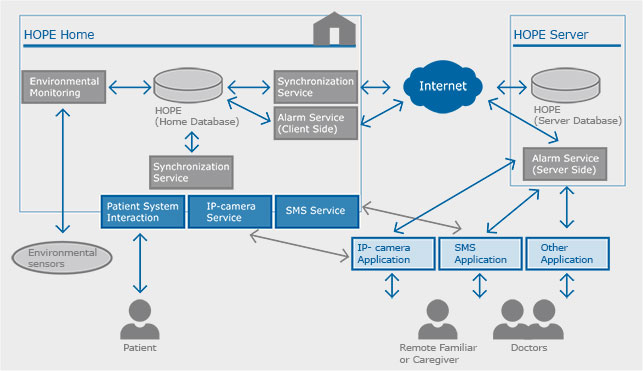The “Hope” solution consists of an integrated, smart platform that enables the elderly people with Alzheimer’s disease to use innovative technology for a more independent life,
easy access to information, monitor their health, which provides a basis for integrating services for the elderly population while they are at home. HOPE is a self-operated,
self-adjusted, innovative intelligent IP Based Universal Control Box (UCB) that uses intelligence to manage the various connected subsystems and devices within a residence of the
elderly people.
Overall Approach
HOPE is a budgeted solution that is installed at the elderly people’ homes, and provides services for (a) life-long, self-organized, appropriate educational environment and access to information,
(b) care management and health support, (c) self-monitoring and decision making.
The HOPE solution consists of an integrated, smart platform that manages a smart home with different functionalities for security, fall detection and communication. HOPE system can be
modelled as a distributed system where many agents (subsystem located in each patient 's home) are connected to a main agent, the HOPE server, using IP communication due to Internet access
is currently insured everywhere in Europe. So that, HOPE can be split up into two main blocks: the Server Block and the Home Block which represent the main agent and every subsystem at each
patient’s home respectively. On one hand, HOPE at Home Block covers functionalities associated to each patient’s environment monitoring, indicating alarms if necessary, and is a friendly and
accessible interface between patient and services or applications provided by the system. The Home Block covers functionalities associated to each person’s environment monitoring, indicating
alarms where necessary, as a friendly and accessible interface between older person and services or applications provided by the system.
Main objectives or functions can be modelled like different blocks or components that can be observed in Figure 1.

Figure 1: HOPE System Architecture
Home Block
-
Data acquisition from environmental (temperature, motion, state of the door, gas leak) and health (falls, heart pulse) sensors.
-
Synchronization with main database located at the system Server Block
-
Alarm notification to the user, using voice messages, in case the environmental condition assessment identifies any dangerous scenario that might provoke a fall or other dangerous situation.
-
Simple interfaces for monitoring to relatives, doctors or caregivers, using SMS mobile applications, video monitoring, or by other applications/means.
Server Block
The Server Block is responsible of the “thinking”, decision-making functionalities of the system, including the following ones:
-
Storage all information from any Home System.
-
Alarm service in case of a fall detection to caregivers and relatives.
-
Decision Making and provision of rules for estimating the most appropriated scenario.
-
Interfaces to relatives and doctor to access to the different services.
Who are the potential users of HOPE
-
Patients that are in the initial stages of the disease: The proposed project will support the elderly people to continue with their daily tasks without,
for example, afraid to leave an appliance ON or the door open. With HOPE, they continue feeling useful and capable to participate in life. Also, they have more energy,
have a better social life, continue to be independent, and therefore the disease will become slower in affecting them.
-
Doctors who try to retrieve this information from relatives and people that are close to the patients. This is not always an easy task since, for example,
the relatives may be at work, and the maids are usually interchanged among many, and all are not in the position to understand and explain the exact behavior of the patient.
HOPE is able to provide them with accurate and detailed information regarding the daily behavior of the elderly people, and therefore become a useful tool in the hands of the doctors
for the selection of the best medicine and treatment procedure.
-
The relatives and maids of the elderly people. It is widely accepted that the real victims of Alzheimer disease are the people that care the patients with
the disease. They are faced with a problem above their knowledge and power. Many times their personal, family and professional life is destroyed and the whole process
may result in greater possibility for diseases such as cancer and / or others that are related to the chronic stress that they suffer. HOPE project helps these people to continue
their life without ruin their financial and personal status, be much calmer and have a better relationship with their patient.
Benefits / added value of HOPE
The objective of HOPE is to enhance the quality of life of older people as well as
-
to extend the time people can live in their preferred environment by increasing their autonomy, self-confidence and mobility,
-
to support maintaining health and functional capability of the elderly individuals,
-
to promote a better and healthier lifestyle for individuals at risk,
-
to enhance the security, to prevent social isolation and to support maintaining the multifunctional network around the individual,
-
to support carers, families and care organisations,
-
to increase the efficiency and productivity of used resources in the ageing societies.
Hope is co-funded by the European Commission
and the Ambient Assisted Living Joint Programme
with the AAL-2008-1-099 contract.